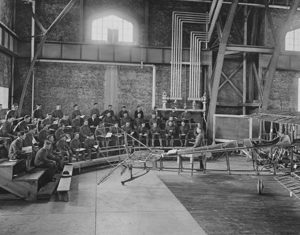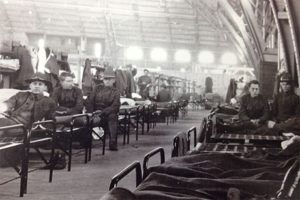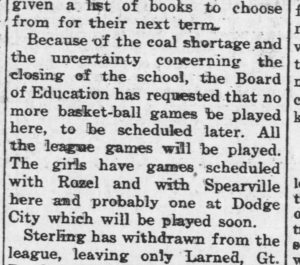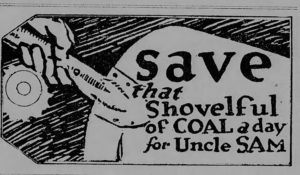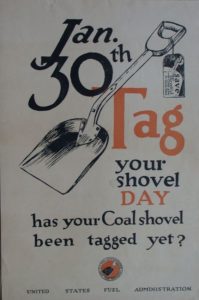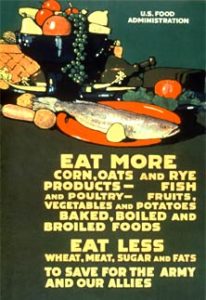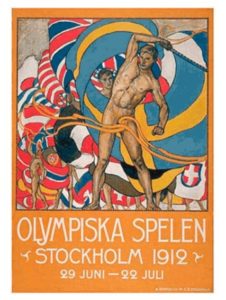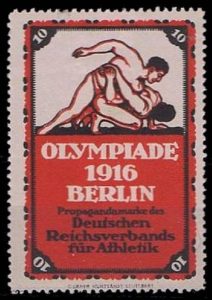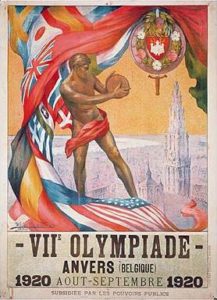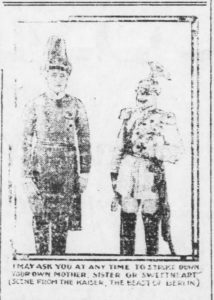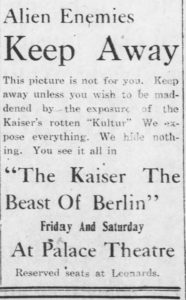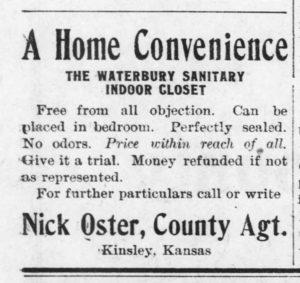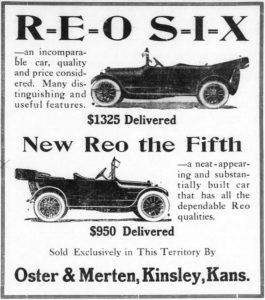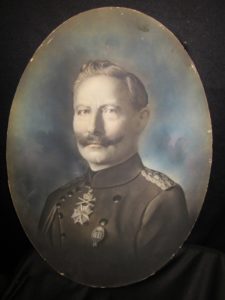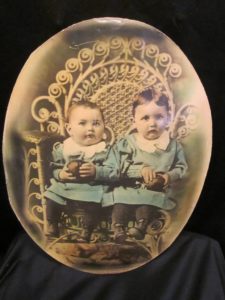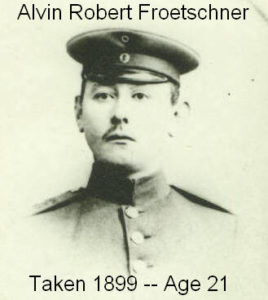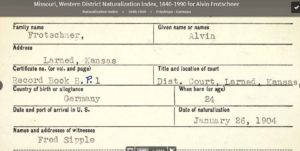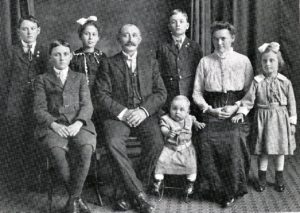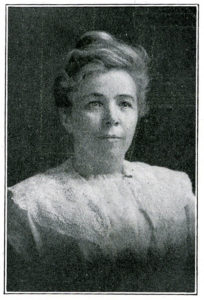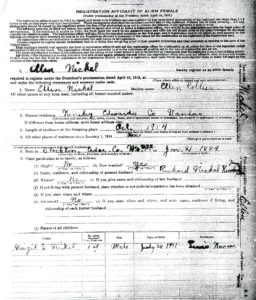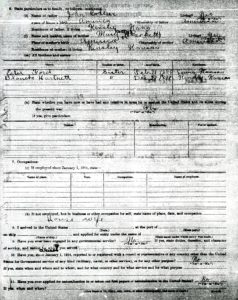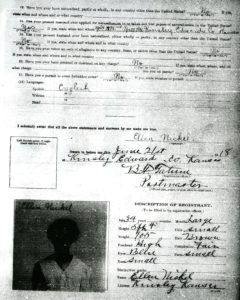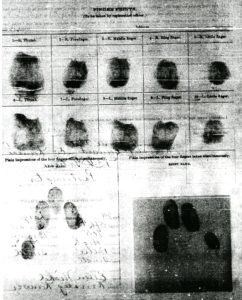My last post introduced you to G. E. Wilson, a Kinsley business man who was appointed the Food Administrator for Edwards County. One week after President Woodrow Wilson’s proclamation on food conservation, and two weeks after his appointment, he wrote the following article for the Kinsley Graphic (February 7, 2017). I decided to reproduce it in its entirety as it highlights the county’s war efforts so far and explains the call to action in regard to food conservation going forth. As you read it, imagine how your diet would change if you were being asked to support our soldiers in this manner today.
ALL SHOULD ENLIST FOR THE WAR
And All Patriots Can Help Win It by Saving Food for our Fighters.
This is not a call to arms, but an earnest request that each man, woman and child enlist at once in the army of food savers.
The people of Edwards County have so far made a splendid response to every demand of the war: when the Red Cross asked you for ten thousand dollars you gave it fourteen thousand; later on you were asked to give five thousand to the Y.M.C.A., the Armenian Relief fund and the local Red Cross and you responded to this call by giving over twelve thousand. The good women have far surpassed every demand made upon them and it is believed their work has scarcely been equaled anywhere in the country. You have been called upon to furnish less than seventy-five fighting men and in response to this call you have sent nearly twice that number into the army and navy. So far you have done well, but we must know and realize the grim truth: “All the blood, all the heroism, all the money and munitions in the world will not win this war unless our allies and the armies behind them are fed; and they will not be fed unless we take car.” All our money will have been wasted, all our toil will have been useless, and all our blood will have been spilled in vain if we fail now to meet and solve the problem of feeding our allies and our army.
New and stringent rules governing the sale of wheat products and sugar are being promulgated and will be strictly enforced. Do not blame your grocer because he requires you to buy certain other things you may think you do not want in order to get a sack of flour, nor because he refuses to sell you but a limited amount of sugar; he is not to blame, but is simply complying with the imperative order of the Food Administration and doing his duty as a good citizen. Under the rule now promulgated no person may buy a sack of wheat flour unless he at the same time buys an equal amount in pounds in the aggregate of one or more of the following substitutes: barley flour, buckwheat flour, rice, rice flour, corn meal, corn flour, corn starch, feterita flour, potato flour, oat meal, rolled oats or hominy corn grits. Many more substitutes will cost you more that wheat flour, but you must remember this: but for the fact that your government has fixed a price on wheat and the profit of the miller, wholesale dealer and retailer, you would now be paying somewhere from five to ten dollars a sack for flour, instead of less than three dollars.
Do not find fault with your baker if you notice a little corn meal or other adulteration in your bread; there will be more in it next week, and the following week, still more until a 20 percent adulteration or substitute is reached, when it will be called WAR BREAD; eat it cheerfully and thank God you are not eating black bread and beet jam by order of the kaiser. The baker is not to blame for this, he is but following the orders given to him by the Food Administration; the substitutes he is using cost him as much or more than wheat flour.
And again do not quarrel with your landlady at the hotel or boarding house, nor with the restaurant keeper, because he refuses to serve you meat on meatless days, pork on porkless days, and wheat bread, pie, cake or any other food prepared in part from wheat on wheatless days, for these too, have joined the army of food savers and are obeying orders; he will lose money by it but that is his sacrifice and service.
Lastly, but by no means least, the great saving is to be in your homes; there you are asked to observe strictly the rules laid down on the food cards. The consumption of wheat products, meats, sugar, and fats must be greatly reduced; every day and every meal avoid wasting food of any kind. Do not confuse saving money with saving food. Those who can afford it would buy the more expensive substitutes, so that those who cannot afford it may have the staple and less expensive substitutes. Observe the rules and follow directions as a patriotic duty, we might say as you should a religious duty. The rules were prescribed by those who are in a position to know and who do know those conditions much better than we do, so it is our plain duty, not to question, but to obey.
United States Food Administration, G. E. Wilson, County food Administrator.
George Edgar Wilson, 1867-1949 Wilson Building, 105-111 E. Sixth St, Kinsley, Build 1910
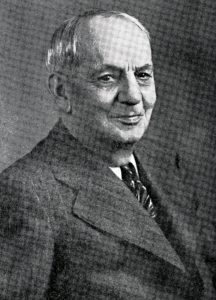
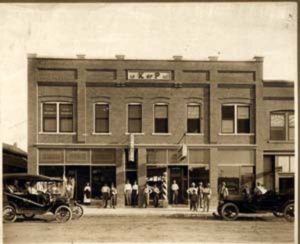
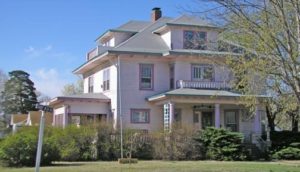 G. E. Wilson Home, 321 E. 8th St., Kinsley Built in 1913
G. E. Wilson Home, 321 E. 8th St., Kinsley Built in 1913
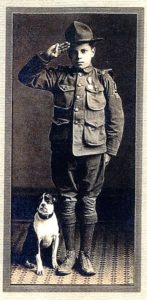

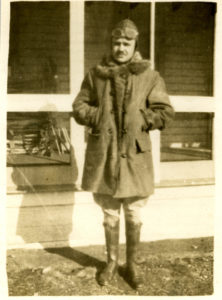 H. G. Britton (Photo shared by W. G. Britton)
H. G. Britton (Photo shared by W. G. Britton)